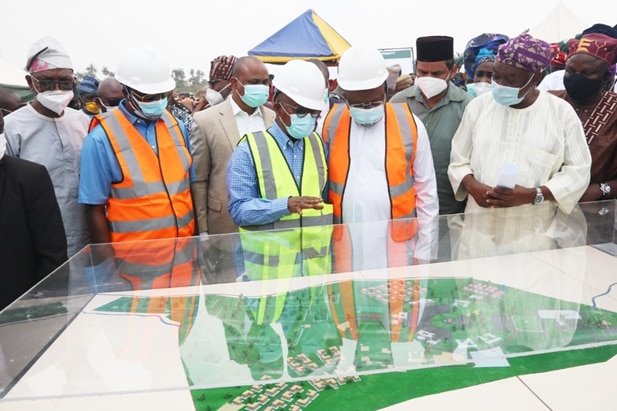Qasim Akinreti, Coordinator MTA Nigeria Studios
On 9 March 2021, the serene city of Ikirun, in the progressive state of Osun was alive with teeming retinue of visitors across Nigeria and the world. The event was the foundation laying ceremony and unveiling of the Minaret International University (MIU) project sponsored by Jamaat-e-Ahmadiyya Nigeria and globally.
The journey for the MIU began in 2016 following a resolution at the annual Shura of Jamaat Nigeria, led by the former Amir of Jamaat Nigeria, Prof Mashuud Adenrele Fasola Sahib.
The Shura proposal came from the Ibadan circuit of the Jamaat; once adopted, it was presented to Hazrat Khalifatul Masih Vaa during a mulaqat by the Nigerian delegation to the Jalsa UK.
The initial main campus was on 600 hectares of land at Agbonbiti in Ile-Ife. But Ikirun was later considered as the main campus, while Agbonbiti will be the satellite campus solely for the Agriculture and Farm Settlement Project.

The Ikirun site was close to the Federal Government College, connected to the national grid and easily accessible from the newly constructed dual carriageway to the town.
Ikirun has a railway terminus, close to Osogbo, the state capital, which equally has an airport, though not completed yet. With a federal university – Obafemi Awolowo University and a private university – Oduduwa University in Ile Ife, the Ife elites were not too keen for the MIU.
The immediate former governor of the state, Ogbeni Rauf Aregbesola, now Minister of Interior, was equally passionate about the take-off of the university, he assisted the Jamaat to reduce the fee for the Certificate of Occupancy of the 530 acres. Once the sum was paid, he accelerated the process of signatory. Ogbeni Rauf Aregbesola participated in the Jalsa Salana of Jamaat Nigeria and supported the establishment of the university while the current governor was the chief of staff.
It should be noted that the Nigerian Vice President, Prof Yemi Osinbajo, also supported the university initiative.
Prof Ishaq Oloyede, the Registrar, Joint Admissions and Matriculation Board, applauded the proposed university during the 100 Years celebration of Jamaat-e-Ahmadiyya Nigeria, in Ilaro.
All documentation with the National Universities Commission is ongoing while the provision for the physical infrastructure for the Minaret International University has commenced. The university will start with three faculties; humanities, sciences and education. The remaining faculties will be added gradually.
This is the first university with both an Islamic and Western education model to be established by the Jamaat.
Ghana had the opportunity of the establishment of a solely theology university years back. As a truly international university, it will draw academicians, researchers and students across the globe.
The vision of MIU, is to pursue intellectual and moral development for creativity, entrepreneurship, adaptability and survival of our university graduates. Such a university education for the youth will be designed to promote academic excellence, moral discipline and the spirit of selfless service for the advancement of socio-economic development, the emancipation of the people and commitment to global cooperation for development and unity of humanity.
The mission is to establish a world-class tertiary institution for the intellectual and manpower development of human resources for sustainable socioeconomic development nationally, regionally and internationally.
The university will be committed to giving opportunity to all qualified candidates at home and from abroad based on merit and equity, through a work-study methodology and without any sectarian or racial discrimination.
The philosophy of the university education is a wholesome one that integrates moral and academic excellence for a healthy development of the mind and body in such a manner that the graduate of our university would be of immense benefit and dignity to himself or herself, to the family, the community, the nation and humanity at large.
The university education will focus on environmentally sustainable growth and development of all aspects of agriculture, energy and transportation infrastructure, water, natural resources, manufacturing and processing, management sciences, engineering, communication technology, humanities as well as scientific and technological research relevant to global development problems and challenges.
In precise terms, as a wholly faith-based university, the philosophy implies the following specific principles:
1. Strict enforcement of moral discipline
2. Guarding against alcoholism and drug addiction
3. Banishment of cultism
4. Infusing theory and practice/work approach through practical entrepreneurship training
5. Philosophy of students’ research projects
6. Sports, physical fitness and martial arts
The MIU, will be guided by the following aims and objectives:
1. Offering admission to various academic and professional programmes of the institution based purely on relevant well-defined and universally accepted academic and moral merits
2. Admission to undergraduate courses in various approved disciplines for all qualified candidates globally
3. Admission to graduate programmes in various approved disciplines based on well-defined qualifications for distinguished graduate students from the institution and other recognised universities and similar institutions globally
4. To provide remedial programmes for interested candidates with deficiencies towards meeting the standards required by merit for various programmes
5. Undertaking and promoting research in areas of environmental and development challenges unilaterally and in cooperation with other research institutions as well as industrial and agricultural establishments
6. Commercialising research findings through pilot projects for the benefit of small-scale enterprises, and invite interested corporate bodies to participate in the efforts to commercialise research findings
7. Engaging in intellectual and charitable community services such as community development projects, public policy analysis, debates and career guidance and counseling for prospective university students
8. Organising academic conferences from time to time to address problems of socio-economic development and environmental challenges
9. Publications of academic journals and monographs through internal and external publishing outfits
10. Business ventures and consultancy services relevant to the competence and capacity of the human resources at the disposal of the university for the promotion of the practical and technical orientation of the university.
Governor Ishaq Adegboyega Oyetola agreed with these objectives in his speech, stating that education and religion are timeless transformations of a society for a truly moral and ethical rebirth. He appreciated the Jamaat for this great gesture at an auspicious time in the history of the state and Nigeria in general.
Jamaat-e-Ahmadiyya Nigeria pioneered Muslim missionary education in Nigeria in 1922 with the opening of the first Muslim primary school, Talim-ul-Islam Primary School Elegbata in Lagos Island, inaugurated by the late Mr Henry Carr, the then Colonial Education officer for the Lagos Colony. Thereafter, the flood gates of Islamic and Western education for teeming Nigerian Muslim children across gender, race and religion commenced, thereby laying a good educational foundation.

The Jamaat-e-Ahmadiyya Nigeria first venture into secondary education followed in the 1950s and 1970s across the country with a special programme called “The Nusrat Jehan Scheme”. Nigeria, Ghana, Sierra Leone and The Gambia profited immensely from this scheme.
In Nigeria, there are over 20 secondary schools in Lagos, Ibadan, Owode, Ogbagi Akoko, Onda, Ara, Umaisha and Kano.
The primary schools across the country were feeders for the secondary educational institutions for the current and next generation of elites for Nigeria.
Within this period, a wholly Islamic Missionary training College, Jamiatul Mubashireen, was established at Ilaro along Owode road in 1976.
Two schools for the memorisation of the Holy Quran for boys and girls aged 9-13 years, were established in Ilaro. The current Ahmadiyya Science College in Ilaro will metamorphose into a technical college any moment from now, as a team of experts and Ahmadi engineers from London visited the Ogun State Commissioner of Education, Science and Technology recently.
Jamaat-e-Ahmadiyya Nigeria was quite methodical in its approach to educational pursuits for better understanding of the religion of Islam, the humanities, science and deep knowledge of the Holy Quran. The educational institutions have produced manpower resources and generated employment for Nigerians.
Minaret International University, obviously, is a great step towards a prosperous, sound and functional education for Nigerians and foreigners as well.


Many thanks for publishing this piece.
Very glad to read this story. Previously, I had the opportunity to meet two Professors and a Vice Chancellor of a Nigerian university and got the impression that the education sector needs more educational institutions and world class universities to ensure quality education in that country.
Good day. Please, may I ask if you studied Medical Laboratory Science through Direct Entry? I am exploring that option and would appreciate any guidance you can provide. Thank you.”